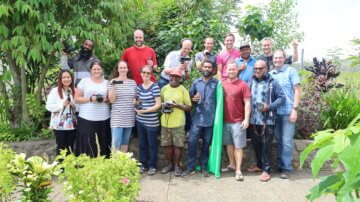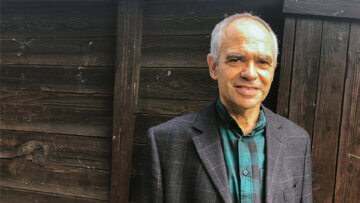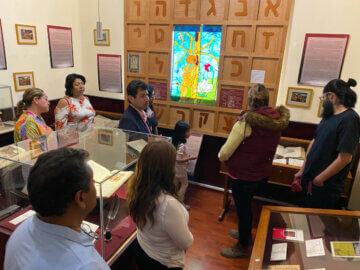New photo library reflects Alliance direction
A new photo library, available to all Alliance organisations, is about more than just sharing images for publications. It reflects the Alliance’s shared values and direction.
The library, found at skip.wycliffe.net, contains more than 15,000 images from around the world. All Alliance organisations and their staff members are encouraged to use the images in corporate and personal communications to illustrate the work of Bible translation. Sign up for a free account here.

“We all recognise the world is becoming more visual,” says Phil Prior, the Alliance’s director for communication. “It's not just about telling people about Bible translation but showing Bible translation, too. This new tool will make that so much easier.”
The previous photo database, also called Skip, needed to be replaced because the software company that created it no longer supported it. Over the past several months, a four-person Alliance team has been transferring and cataloguing images to the new service provided by PhotoShelter, one of the world’s leading providers of digital asset management platforms.
Ling Lam, based in Hong Kong and a member of the Alliance Communications team, leads the Photo Team. She says users will notice immediate improvements from the old system. For one, choosing and downloading photos is far less cumbersome and requires fewer mouse clicks and redirects.
“In the past, it looked like a shopping page where you would get an invoice,” she says. “And then you would get an email in order to download the photos. But with this new system, you can do everything right there. You find a picture you want, click ‘download’ and choose the size you want, from extra-large to extra-small and to fit your purpose like high resolution or low.
“So it is quite a step forward from what we had. If you take just five minutes to navigate around, you will know exactly how it works. It's very easy.”
Users also can create their own workspaces, enabling quick recommending and sharing of photos among teams.

From the photo library: Obed Busi (whose mother tongue is Deg) harvests ground nuts from the field on his mother's farm in New Longoro, Ghana. His mother has this farm as part of a micro enterprise developed from Ghana Institute of Linguistics, Literacy and Bible Translation’s (GILLBT) Development Assistance Training Program. Photo: Rodney Ballard
‘Generously give … graciously receive’
The photo library represents more than just a new software solution. It embodies the journey that has been steadily taking place among the entire Alliance. Photos were once provided largely by a central team. Now, the library will rely completely on photo contributions from Alliance organisations and partners.
“This fits very well with the Alliance journey,” Ling says. “We have moved away from having full-time photographers who travelled around the world, and then Alliance organisations were purely the users of these resources,” Ling says. “Now, representatives from all the areas, local photographers, can also contribute.”
“We feel that the Alliance is a community where all of the organisations generously give and graciously receive. We hope that this new system will become a powerful illustration of this mindset.”

From the photo library: A student shares about a recent missions trip during the Sunday morning worship at Tokyo Deaf Church. Photo: Heather Pubols
Sharing the cost
For Skip to be as good as it can be, Alliance organisations will need to work together both in funding it and keeping it stocked with current photos. Wycliffe USA has funded the first two years of software licensing and maintenance through a targeted grant, but starting in late 2024, the Alliance will seek to fund the service as a project. The estimated cost is $7,500 US per year. Any number of Alliance organisations could choose to contribute.
“We will also need people to share their best images to illustrate how this global movement works,” Phil adds. “And as this resource grows and develops, there will be opportunities for more people to get involved with managing the system.”
The arrangement reflects the Alliance’s core value of Partnership and Service: “Partnering interdependently as an expression of the unity of believers. Serving in community through holistic ministry that facilitates translation, access and application of God’s Word.”

From the photo library: a large plant in Costa Rica. Photo: Rodney Ballard
A global team
The people working together to manage Skip come from Alliance organisations.
Along with Ling, the Alliance Photo Team includes Daisy Kilel from BTL Kenya, and Gary McMaster from Wycliffe Australia. The team hopes to add one more member, from the Europe area. Anyone interested can contact Ling.
“Our mission for this small team is to collect new photos from local photographers in various areas,” she says. “Soon we will invite people to contribute their photos. The system allows us to create positions for contributors, where they can upload their photos directly.”
From there, the Photo Team will review the pictures to make sure they meet quality standards. They also can review and edit the caption information. Finally, they will place images into the library and different categories, where they can be used by anyone in the Alliance.
Usage rights
All images in the library are provided under the Creative Commons license of CC:BY 4.0 or CC:BYNCND 4.0 unless otherwise specified. Users should always click on “Show info” and check the information under “usage right”. If no usage rights are mentioned, the Photo Team asks that users follow CC:BY 4.0, including giving credit to the photographer. If users fail to follow these requirements, their access could be revoked.
Thus far, the library contains only photos. But eventually, it might also include PDF versions of organisations’ magazines, plus additional story material that other Alliance organisations could use. Video clips are another possibility, but that would require far more storage capacity and funding.
Story: Jim Killam, Wycliffe Global Alliance
Images used with this story can be found in the new Skip photo library.
The latest
View all articles
03/2024 Pacific: Papua New Guinea
Informing, teaching, inspiring: PNG workshop teaches video storytelling for language communities
PNG workshop teaches video storytelling for language communities
Read more
02/2024 Global
Looking ahead at 2024
As the year unfolds, we marvel at the work of God in our rapidly changing world. And, we look forward to a number of gatherings and conversations intended to draw us together.
Read more
01/2024 Americas
Telling the Bible's Story
It may come as a surprise that a museum is among the Wycliffe Global Alliance organisations.
Read more